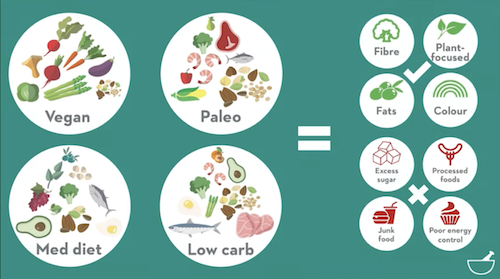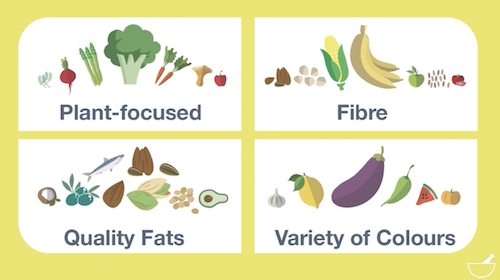Nutritional Interventions for Longevity and Health

Nutritional interventions for longevity and health do exist, and they’re not some mystical potions. Most of them you probably know, but the details matter if your aim is to optimize your healthspan. Let Drs. Aujila, Huberman and Norton lead the way.

Nutritional interventions for longevity are the same approaches you should take to optimize your health and be disease-free. I took readers into a deep dive on this topic in Part 2 of my four-part series about prerequisites for longevity, and now I want to cement it into your thoughts with two videos:
- Dr. Rupy Aujla’s Ted Talk about making food your medicine, and
- Dr. Andrew Huberman’s interview with nutrition expert Dr. Layne Norton.
Dr. Aujlas’s presentation is short. Dr. Huberman’s interview is very long. To spare you some time, if wanted, I summarize both, although differently given their respective lengths.
Much of this you’ve undoubtedly heard before, such as:
- Eat more plant food, less meat
- Eat more fiber
- Eat more nuts and seeds
- Eat more quality fats, such as omega-3 fatty acids
- Eat more complex carbs, less simple carbs
- Eat enough protein
- Eat less processed foods
- Maintain an energy balance if you’re lean*
(*Calories in – calories out), or an energy deficit if your overweight (calories in < calories out.)
But details matter, as you’ll see in the Huberman interview, there are details!
So, let’s dig in…
Dr. Aujla: Let Food Be Your Medicine
“The biggest impact on your health is not with a blockbuster drug, it’s not with a new pioneering surgical technique, it’s with the simplest solution. It’s how we feed ourselves”, says Rupy Aujla, a medical doctor who believes modern medicine is fundamentally missing a focus on nutritional medicine.
Dr. Aujila is among a growing cadre of medical doctors, perhaps Dr. Mark Hyman the most notable, who are trying to get the medical establishment and people in general to recognize that “food is medicine”.
In his book, Outlive, Dr. Peter Attia describes the need for Medicine 3.0, which is what he practices in his clinic. As I describe in my review of Outlive:
- Medicine 1.0 was the first era of medicine that lasted about two thousand years, exemplified by Hippocrates. Its conclusions were based on direct observation and guesswork.
- Medicine 2.0 is what’s mostly practiced now, and is mainly about dealing with the symptoms of disease.
- Medicine 3.0 is what Attia practices and advocates, but is rare. It deals with prevention by first understanding the seminal causes of the most pernicious and life-threatening chronic diseases that kill us, especially as we age.
A big part of Medicine 3.0 consists of nutritional interventions for longevity and health.
Dr. Aujila is completely in alignment with Dr. Attia; he’s pushing for Medicine 3.0 by founding Culinary Medicine, a non-profit organization that teaches doctors and medical students the foundations of nutrition, as well as teaching them how to cook. He also focuses on educating the general public about nutrition and cooking healthy recipes via his company, The Doctor’s Kitchen, and his book, Eat to Beat Illness.
If you have 15 minutes to spare, watch his Ted Talk; otherwise, read my summary below the video.
After he describes a poignant personal experience meant to grab the audience’s attention, Dr. Aujila doubles down:
I have 15 minutes to save your life, or more specifically i have 15 minutes to help prevent the deaths of roughly 50 of the adults in this audience today who will succumb to preventable lifestyle related illnesses like heart disease, stroke and complications of metabolic disease — lifestyle related illnesses that cause millions of deaths worldwide.
(These are among the “four horsemen of chronic disease” that I detail in my post, The Four Horsemen of Disease: The Impact of Aging Hallmarks and Signaling Dysfunction.)
He points out that there need not be a battle between meat eaters, vegans and vegetarians, because if done correctly, they have several things in common, as the infographics below screenshot from the video shows:


Popular diets that have credible studies, he asserts, include Paleo, Low Carb, Mediterranean, and Dash. They have overlapping themes: they advocate the consumption of whole and plant-based foods of various colors, phytochemicals, fiber and healthy fats; and eschew junk food, processed food, and excess sugar and salt.
Although Dr. Aujila doesn’t mention epigenetics, he explains it indirectly by explaining that “a diet rich in plant-based foods has the ability to interact with the very core of our existence, our DNA, and alongside other lifestyle factors like stress and sleep, food has the potential to switch genes on and others off.” This gene switching is within the province of epigenetics. What this distills down to is that your behaviors and environment can activate and deactivate gene expression, either for good or ill. (Learn more about epigenetics.)
Many organizations, including the world health organization, says Dr. Aujila, recognize that eating a prudent diet dominated by plant foods lower the risk of chronic kidney, disease autoimmune conditions, inflammatory bowel disease, cancer, depression and obesity. This truth pervades how he manages the health of his patients.
For example, as he relates in the video, a 45 year old patient’s blood work indicated that he was on the verge of type 2 diabetes (also called “adult-onset diabetes”). This patient’s diet was dominated by convenience foods and he wasn’t keen to change that all at once, but he was willing to start with one meal — he exchanged his frosted wheaties breakfast for oatmeal, to which he added sunflower seeds and berries.
Change can be heard for many people, so it’s sometimes wise to do it in small steps as guided by Stanford University’s Dr. BJ Fogg and his “tiny habits”, whereby you begin changing a big, unwanted habit with a tiny, wanted one that is triggered by an already established habit. Aligning with that methodology, Dr. Aujila advises that every time you look at a plate of food, or you sit down to eat, can you eat just one more colorful vegetable, portion of nuts or seeds, or fruit? (Read How To Make Tiny Habits Big.)
Once you do that for every meal, it could make a world of difference to your health, says Dr. Aujila.
And now let’s double down on this nutrition theme with Drs Andrew Huberman and Layne Norton.
Huberman Interviews Norton: Nutritional Interventions for Longevity and Health
This interview between Dr. Huberman and Dr. Norton is for the diehards — those of you who really want to understand nutrition and get some clarity on various topics that are debated everywhere by nearly everyone.
In the video below, Dr. Andrew Huberman interviews Layne Norton, Ph.D., who is an expert in protein metabolism, fat loss, and nutrition, holding degrees in biochemistry and nutritional sciences.
The topics they discuss include:
- Energy balance,
- Artificial sweeteners,
- Gut health,
- Fasting,
- Protein requirements,
- Various diets, and
- Supplements.
These subjects are commonly debated across various platforms such as the media, the Internet, fitness centers, and family gatherings. Unfortunately, much of the information circulated in these discussions is inaccurate, leading to widespread misinformation. We need to get the facts straight so we can learn the correct nutritional interventions for longevity and health.
What we want is to know what the science says about all this, even though — as it’s designed to do — the science can change from time to time as new information is studied and potentially changes the status quo.
Here are your options: watch the video, or scan my time stamped notes below the next video for topics discussed to find what interests you, or do both.
Here’s the rundown, along with my notes and explanations :
[17:48] 🥩 Different macronutrients have varying thermic effects, with protein requiring more energy for digestion, and having a higher thermic effect compared to fat and carbohydrates. (Note: When it comes to macronutrients (carbohydrates, protein, and fat), having a higher thermic effect refers to the increased amount of energy your body expends digesting, absorbing, storing, and metabolizing that particular macronutrient. In simpler terms, it basically means burning more calories through these processes.) [18:45]💡 Protein, when consumed in excess, is less likely to be stored as fat due to its high thermic effect and satiating nature. (Note: What’s “excess” protein? This is a hotly debated topic. My 2 cents: If you do not do resistance training, 1 gram per kg of lean body mass is sufficient — so subtract your body fat weight. If you do resistance training, 1.5 to 2 grams per kg of lean body weight.) [19:11] 🧠 Physical activity comprises exercise and NEAT , with NEAT being spontaneous movements like fidgeting. (NEAT stands for Non-Exercise Activity Thermogenesis. It refers to the energy your body expends for everything you do that’s not sleeping, eating, or structured exercise.) [20:07]🏃 NEAT is not consciously modifiable and tends to increase spontaneously, particularly in individuals resistant to obesity. [21:34] 🔥 NEAT can contribute significantly to daily energy expenditure, with some studies suggesting up to 1,000 calories per day. (Note: This means it’s very useful to move regularly throughout the day.) [23:22] 🔄 NEAT is the most modifiable component of energy expenditure, with even a 10% reduction in body weight resulting in a decrease of nearly 500 calories per day. [26:06] 🚫 Fitness trackers often overestimate energy expenditure by significant margins, making them unreliable for weight management. [27:01] ⚖️ Consistent and accurate weight tracking, preferably in the morning after using the bathroom, helps monitor progress effectively during intentional weight loss. [28:51] 📉 Weight fluctuations can discourage individuals from weight loss efforts, emphasizing the importance of consistent tracking and understanding fluid shifts. [32:11] 💪 High Intensity interval training may not offer significant advantages over moderate or low intensity cardio in terms of fat loss despite its post exercise metabolic increase. (Note: but it can contribute to increasing muscle mass and VO2 max — both essential for improving healthspan.) [33:36] 🍽️ The choice of exercise should consider its impact on appetite, lean muscle mass development, and overall energy balance for effective weight management. [36:27] 🔄 Calorie Tracker Reliability: Calorie trackers may not accurately measure calories burned but can still offer relative comparisons within sessions. Tracking steps can help maintain activity levels during fat loss diets. [37:24] 💡 10,000 Steps Myth: The 10,000 steps per day guideline originated arbitrarily and lacks scientific basis, underscoring the importance of critical interpretation of research findings. (That said, get as many steps as you can each day. This will use up calories and help keep your joints mobile to some extent.) [39:45] 🧠 Placebo Effect and Physiology: The placebo effect can significantly influence physiology, impacting outcomes as profoundly as some pharmaceuticals, emphasizing the power of belief in health interventions. [42:07] 🏋️♂️ Exercise and Appetite: Despite common beliefs, exercise generally suppresses appetite and offers numerous health benefits beyond weight loss, such as improving biomarkers of health. [43:32] 🕒 Exercise for Longevity: Regular exercise is highlighted as the most impactful factor for improving healthspan and lifespan, outweighing other interventions like supplements or medications. (See my post, 4 Exercise Prerequisites for Longevity.) [44:56] 🥗 Exercise and Satiety Signals: Exercise increases sensitivity to satiety signals, potentially explaining its role in weight loss maintenance by regulating appetite more effectively. [48:13] 🧠 Psychology and Physiology in Eating Behavior: Psychological factors like stress, boredom, and social influences significantly contribute to eating behavior, underscoring the need for holistic approaches to weight management. [51:04] 🍽️ Comprehensive Approach to Weight Loss: Effective weight loss strategies need to address a broad spectrum of factors, including physiological adaptations, psychological aspects, and social influences, to succeed in the long term. [53:30] 🍽️ Eating disorders and disordered eating patterns can be harder to break than other forms of addiction due to the necessity of food consumption. [56:50] 🤔 Many obese individuals lose significant weight at some point in their lives, but often struggle to keep it off due to not planning for maintenance after initial weight loss. [58:19] 🛤️ Different dietary approaches can be effective for weight loss, but long term adherence is key, and individuals should choose an approach that feels sustainable for them personally. [01:00:15] 💡 The most important factor for successful weight loss is adherence to a chosen dietary approach, regardless of the specific diet’s mechanisms. (Note: I vote for the Mediterranean Diet for reasons I expound upon here.) [01:04:05] 🔄 Switching between different dietary approaches, like low carb and omnivore, can be a viable strategy as long as overall calorie control and behavior patterns are maintained. [01:06:56] 🩹 Transitioning between extreme dietary changes may cause short term physiological adjustments but is generally not harmful if done gradually and with attention to calorie intake. [01:10:41] 🧬 Gut health’s role in metabolism and weight management is still not fully understood, and scientific consensus on its implications may take time to develop. [01:11:39] 🍽️ GLP1 mimetics like semaglutide, used for obesity treatment, act as powerful appetite suppressants through gut/brain axis regulation. (GLP-1, or glucagon-like peptide-1, is a naturally occurring hormone produced in the small intestine. It plays a crucial role in regulating blood sugar levels and has emerged as a promising therapeutic target for type 2 diabetes and obesity.) [01:12:36] 🧠 GLP1 impacts both brain and gut pathways, influencing satiety signals in the hypothalamus and mechanosensors in the gut, respectively. [01:16:50] 🌿 Dietary fiber positively impacts gut health as a prebiotic, promoting the production of short chain fatty acids with potential health benefits. [01:18:41] 💊 Consuming fiber-rich foods is more effective for promoting gut health than probiotic supplements, as probiotics may not colonize or persist without adequate fiber intake. (Here’s how to get more fiber in your diet.) [01:22:33] 🦠 While research on the gut microbiome is still evolving, consuming diverse fiber sources and avoiding excessive saturated fats may support gut health and overall well being. [01:24:00] 🔬 Changing scientific opinions often result from cumulative evidence rather than single studies, highlighting the importance of considering a broad range of research findings for informed conclusions. [01:29:45] 💡 Research shows that altering specific molecules doesn’t always lead to desired effects at the organism level, highlighting the complexity of biological systems. [01:30:12] 🧪 Leucine supplementation alone doesn’t significantly increase muscle mass because muscle building involves a balance between protein synthesis and degradation. (Note: leucine is the amino acid most responsible for activating muscle protein synthesis; namely, the building and repair of muscle tissue. It’s essentially the anabolic counterpart to muscle protein breakdown. [01:30:41] 📊 Plasma leucine levels don’t correlate directly with muscle protein synthesis duration, challenging assumptions about meal timing and protein synthesis. (Note: timing protein ingestion right before or after resistance training is not necessary.) [01:32:35] 🔄 Muscle protein synthesis exhibits a refractory period, suggesting that continuous protein intake may not further enhance synthesis. [01:37:21] 🍽️ Protein is a key macronutrient for satiety, muscle maintenance, and fat loss, with a recommended intake of around 1.6 grams per kilogram of body weight. (Note: notice that this generally exceeds my recommendations, the biggest difference being that I base my numbers on lean body weight, not total body weight.) [01:43:00] 🍗 The satiety level of protein rich foods varies, with whole, unprocessed sources like chicken breast generally more satiating than processed options like protein bars. (I would add that plant-derived proteins, such as soybeans, lentils and beans are also satiating.) [01:44:55] 🕒 Optimizing protein intake frequency is important, but obsessing over meal timing and protein assimilation limits may not be necessary for most individuals. [01:46:46] 🥩 Protein lacks a storage mechanism like fat and carbohydrates, making its distribution throughout meals crucial for muscle protein synthesis stimulation. (Note: although some recent studies suggest that we can use more ingested protein at one time than previously thought, it’s wise to spread the consumption of it throughout the day.) [01:52:29] 🍽️ Mild forms of time restricted eating, like 16/8 intermittent fasting, seem to have minimal impact on lean body mass, especially with sufficient protein intake and resistance training. (Note; 16/8 refers to eating within an eight hour window and fasting the rest of the time over 24 hours, which includes sleep time.) [01:55:24] 🌱 Building muscle on a plant based diet is possible but may require careful planning and consideration of protein quality and distribution. [01:57:19] 💪 Leucine content appears crucial for stimulating muscle protein synthesis, with isolated sources of protein offering advantages in bioavailability and amino acid profile. [02:02:34] 🌽 Plant Based sources like corn can be rich in leucine, offering options for enhancing protein blends to support muscle growth in vegan diets. [02:04:56] 🍎 Focusing on minimally processed foods, cooking our own meals, and avoiding highly processed foods with lots of sugar is crucial for health and longevity. [02:06:20] 🤔 Minimally processed foods are important, but understanding why processed foods can lead to overeating is crucial; it’s mostly about increased calorie intake rather than the specific nutrients. [02:08:42] 🚫 Highly processed “keto” or “plant-based” foods, like mac and cheese or keto ice cream, can undermine weight loss efforts due to their high caloric density and palatability. [02:11:04] 💡 The appropriateness of processed foods depends on individual goals; for athletes with high caloric needs, processed foods might be necessary to meet energy demands. [02:16:18] 🏋️ Obesity isn’t solely due to overeating; factors like trauma, income, and access to healthy foods play significant roles. Blaming individuals overlooks these complexities. [02:18:16] 🍬 Sugar intake alone might not be the main problem; low fiber content in sugary foods could be more concerning for health outcomes. [02:21:59] 🍬 Sugar may not have positive health effects, but focusing on fiber intake is more beneficial for health. (Nonetheless, don’t add sugar to your food and read food labels to see how much sugar is added.) [02:23:27] 🧠 Restricting specific nutrients can lead to cravings and binge eating, emphasizing the importance of balanced eating habits. [02:26:47] 🥤 Artificial sweeteners, like stevia, can be consumed moderately without major health concerns based on current data. [02:30:06] 🥤 Non-nutritive sweeteners can be a beneficial substitute for sugar sweetened beverages, leading to improvements in health markers. (Erythritol and stevia are decent sugar substitutes if consumed in moderation.) [02:33:01] 🩺 Replacing sugar sweetened beverages with artificial sweeteners can lead to significant weight loss without replacing calories with food. [02:38:10] 🍹 Using artificial sweeteners as a tool for weight loss can be effective, but their long term health effects compared to water are uncertain. [02:40:34] 🦠 Consumption of artificial sweeteners, like sucralose, may impact specific species of gut bacteria, but the long term implications are not fully understood. [02:41:01] 🍽️ Sucralose, a nonnutritive sweetener, may have metabolic effects, but whether they’re good, bad, or neutral is still unclear. [02:42:27] 📊 Statistical significance in research doesn’t always reflect practical significance; focus on the overall data, not just isolated points. [02:43:26] 🤔 Personal behavior around artificial sweeteners may change based on new research, but nuanced interpretation is crucial. [02:44:22] 🧪 A study on artificial sweeteners involved both human and animal arms, with a focus on participants who avoided artificial sweeteners prior to the study. [02:45:49] 🚫 Blindness in studies regarding artificial sweeteners can be challenging, especially when participants have never consumed them before. [02:49:08] 💡 Artificial sweeteners may not be metabolically inert, suggesting potential effects beyond just taste. [02:53:00] 🏋️♂️ The extent to which aggressive dieting affects lean mass depends on factors like initial body fat percentage and the duration of the diet. [02:55:50] 🍽️ Satiety can be influenced by various factors including food appearance and plate color, highlighting the complexity of human eating behavior. [02:59:14] 🍳 Seed oils, such as canola oil, have contributed negatively to overall health due to their increase in calorie load, but epidemiological evidence regarding their independent negative effects is inconclusive. (Use cold pressed, extra virgin olive oil or avocado oil.) [03:00:35] 🥩 Substituting saturated fats with polyunsaturated fats in diet tends to have either neutral or positive effects on inflammation and cardiovascular disease markers. [03:02:30] 🍽️ Consuming monounsaturated and polyunsaturated fats instead of saturated fats is recommended based on human randomized controlled trials, but excessive consumption can lead to increased calorie intake. [03:03:52] 🔄 Consideration of overall energy toxicity from overconsumption of calories is crucial, rather than focusing solely on specific nutrients like seed oils or saturated fats. [03:06:13] 💪 The impact of low saturated fat intake on testosterone levels hasn’t been definitively linked to loss of lean mass, although some studies suggest polyunsaturated fats may support lean mass gain. [03:08:33] 🚺 There are generally no significant differences between male and female responses to various diets, with similar calorie deficits producing similar results. [03:10:01] 🏋️♀️ Women have the potential to gain lean mass similarly to men with appropriate training, although differences in fiber types and recovery rates may exist. [03:14:19] 🍎 Cooking foods can increase their digestibility and bioavailability of nutrients, while excessive charing should be avoided due to potential carcinogenic compounds. [03:17:42] 🛑 Carb blockers like white kidney bean extract may reduce carbohydrate absorption but do not necessarily lead to weight loss, as they alter the form of calories rather than eliminating them. [03:19:05] 🍟 Olestra craze in the ’90s aimed to reduce calorie absorption; highlights gastric emptying time’s role in energy balance and discusses laxative abuse. [03:20:01] 🍽️ Fiber aids digestion by adding bulk; low GI foods tend to have more fiber, showing benefits in studies without calorie control. (Note: GI refers to Glycemic Index. Read my post, Simple Carbs vs Complex Carbs for Longevity.) [03:21:54] 💊 Creatine monohydrate is well supported for muscle gain and recovery; other forms are less effective or more expensive. [03:26:13] 🌿 Rhodiola rosea shows promise in reducing physical and perceived fatigue; anecdotal evidence suggests it pairs well with caffeine. [03:30:32] 💪 Consistency and hard work outweigh supplements; focus on proper nutrition, recovery, and training over relying solely on supplements. [03:34:21] 🧠 Challenging oneself mentally and physically may reduce the risk of cognitive decline; embracing hard things builds resilience and satisfaction.Well, that’s it. If you’ve absorbed even half of this, you’re well on your way to adopting the nutritional interventions for longevity and health.
Please send this post to anyone you think would benefit from it.
And if you’re not already, become a Subscriber.
Last Updated on March 9, 2024 by Joe Garma


